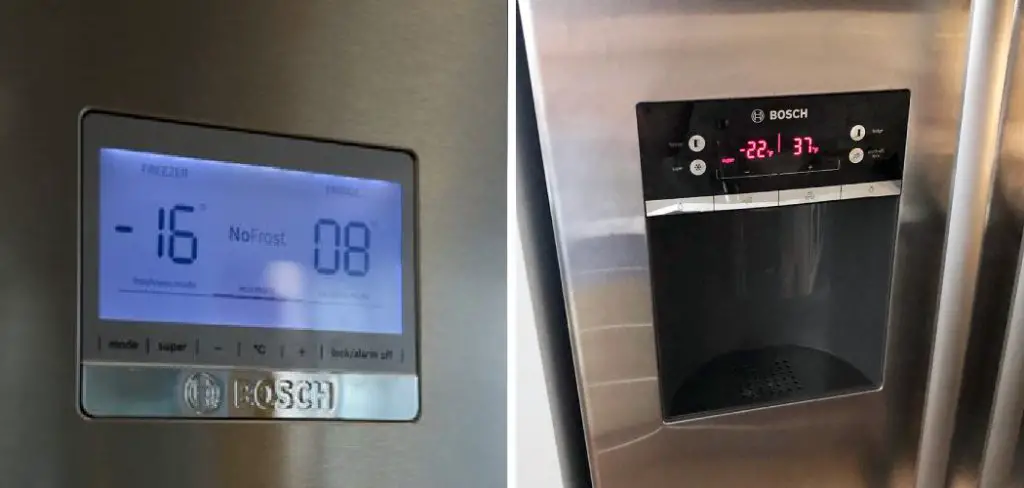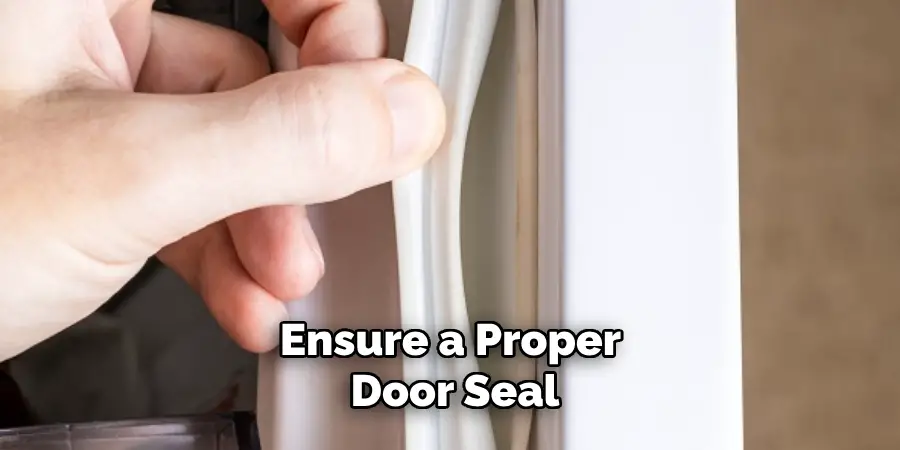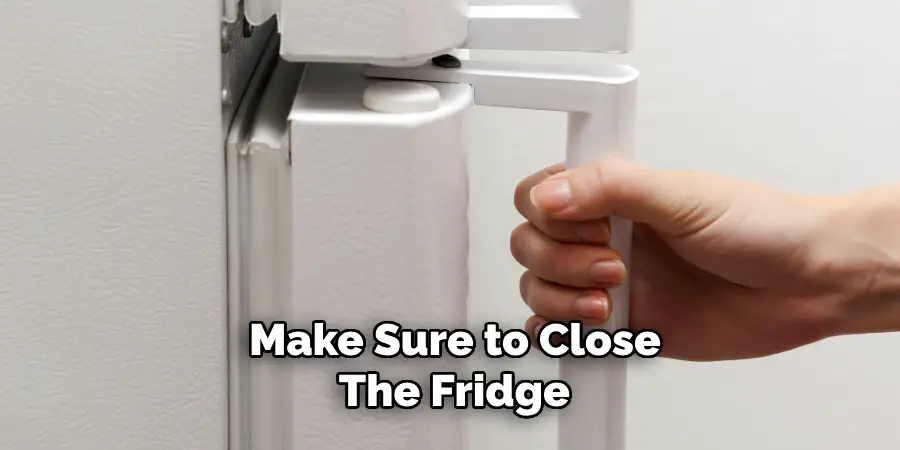Are you tired of constantly hearing the annoying beeping sound from your Bosch fridge freezer? It’s likely that the alarm has been triggered due to a change in temperature or if you accidentally left the door open.

But don’t worry, resetting the alarm is a simple process that can easily be done at home.
Dealing with a constantly beeping fridge-freezer alarm can be quite frustrating, especially when you’re unsure how to address the issue.
Bosch fridge-freezers are equipped with alarms that alert users to various issues, such as a door left ajar or internal temperature problems. Knowing how to reset this alarm not only ensures your appliance continues to run efficiently but also provides peace of mind.
In this guide, we will walk you through the steps needed on how to reset Bosch fridge-freezer alarm, helping you maintain an optimal cooling environment for your food.
What are the Benefits of Resetting the Alarm?
Before we dive into the steps, let’s first understand why resetting the alarm is important.
- Prevents Food Spoilage: A triggered alarm can indicate that there is an issue with your fridge-freezer’s cooling system, which can lead to food spoilage if not addressed promptly. Resetting the alarm ensures that your appliance functions properly and your food stays fresh.
- Saves Energy: An alarm that keeps going off can result in unnecessary energy consumption, leading to higher electricity bills. By resetting the alarm, you ensure that your fridge-freezer is running efficiently, saving you money in the long run.
- Avoids False Alarms: Sometimes, the alarm may be triggered due to a minor issue, such as a temporary change in temperature. By resetting the alarm, you can avoid false alarms and unnecessary stress.
- Extends the Lifespan of Your Appliance: Constantly ignoring a triggered alarm can put unnecessary strain on your fridge-freezer, potentially shortening its lifespan. Resetting the alarm helps to keep your appliance in optimal condition.
These are just some of the benefits of resetting your Bosch fridge-freezer alarm. Now, let’s get into the steps on how to reset it.
What Will You Need?

- A Phillips-head screwdriver
- A soft cloth or sponge
- Mild soap and water solution for cleaning, if needed
Once these items are ready, you can move on to the reset process.
10 Easy Steps on How to Reset Bosch Fridge-freezer Alarm
Step 1. Locate the Control Panel:
The first step in resetting your Bosch fridge-freezer alarm is to identify where the control panel is situated. Typically, the control panel can be found either inside the fridge compartment, near the top, or on the front of the appliance.
It may also be located on the side or along the edge of the door. The control panel will usually have a digital display and several buttons or touch controls that allow you to manage the settings of your fridge-freezer.
Step 2. Understand the Control Panel Layout:
Once you’ve located the control panel, take a moment to familiarize yourself with its layout. Look for any symbols or labels that indicate alarm settings, temperature controls, or specific functionalities.
Most Bosch fridge freezers will have clearly marked buttons for power, temperature adjustments, and alarms. If necessary, refer to your appliance’s user manual for a detailed explanation of the control panel and its features.
Step 3. Open the Door(s) and Inspect:
Carefully open the fridge and freezer doors to check if any items are obstructing the doors from closing properly. Sometimes, a misplaced item or an overstuffed fridge can prevent the door from sealing correctly, triggering the alarm. Inspect the door gaskets as well, ensuring that they are clean and intact.

The gaskets should not have any tears or debris that could interfere with their function. It’s crucial to correct any issues you find to ensure a proper door seal, which is essential for maintaining the right temperature inside your fridge-freezer.
Step 4. Check the Temperature Settings:
Evaluate the current temperature settings on the control panel. Bosch fridge freezers usually have recommended settings, such as around 37°F (3°C) for the fridge and 0°F (-18°C) for the freezer. If the temperature is set too high or too low, it can trigger the alarm.
Adjust the settings as necessary to bring them back within the optimal range. After making adjustments, it’s a good idea to wait for a few hours and monitor if the internal temperatures stabilize within the recommended ranges.
Step 5. Reset the Alarm Manually:
To reset the alarm manually, you will need to press and hold the alarm reset button for a few seconds. The exact location of this button may vary depending on the model of your Bosch fridge-freezer, but it is typically marked with a bell or an exclamation icon. Holding down this button will often silence the beeping and reset the alarm system.
If your model does not have a specific reset button, you may need to use the control panel’s touchscreen or physical buttons to navigate to the alarm settings and manually turn off the alarm from there. Refer to the user manual for specific instructions related to your model.
Step 6. Close the Doors Properly:
After manually resetting the alarm, make sure to close the fridge and freezer doors properly. Ensure there are no obstructions or protruding items that could prevent the doors from sealing tightly.

A secure door seal is essential for maintaining the correct internal temperature and preventing the alarm from being triggered again.
Close each door gently but firmly, listening for the sound of the seal engaging. This will help confirm that the doors are fully closed and there are no gaps where warm air could enter.
Step 7. Clean the Door Gaskets:
Over time, dirt, grime, and food particles can accumulate on the door gaskets, compromising their ability to form a tight seal. Cleaning the door gaskets periodically is essential for maintaining their effectiveness.
First, prepare a mild soap and water solution to clean the gaskets. Use a soft cloth or sponge to gently scrub the gasket surfaces, paying close attention to any grooves or crevices where debris might be lodged.
Avoid using harsh chemicals or abrasive tools, as these can damage the rubber material. Once cleaned, wipe the gaskets with a damp cloth to remove any soap residue, and then dry them thoroughly. This simple maintenance step can go a long way in ensuring a proper door seal and preventing future alarms.
Step 8. Inspect the Condenser Coils:
Your fridge-freezer’s condenser coils play a vital role in the cooling process by dissipating heat.
However, if these coils become clogged with dust and debris, their efficiency can be significantly reduced, leading to improper cooling and potential alarm triggers. Locate the condenser coils, which are usually found at the back or underneath the appliance. Before cleaning them, unplug the fridge-freezer to ensure safety.

Use a coil brush or a vacuum cleaner with a brush attachment to gently remove the accumulated dirt. Regular cleaning of the condenser coils helps prevent alarm issues and enhances your appliance’s overall energy efficiency.
Step 9. Check for Power Supply Issues:
An intermittent or unstable power supply can cause your Bosch fridge-freezer to malfunction and trigger the alarm.
Ensure that the appliance is securely plugged into a functioning electrical outlet. Additionally, examine the power cord for any signs of wear or damage. If you notice any issues, it may be necessary to replace the cord or seek professional assistance.
Also, consider installing a surge protector to protect your appliance from power surges that can disrupt its operation. Ensuring a stable power supply is crucial for the consistent performance of your fridge-freezer.
Step 10. Monitor the Appliance:
After performing all the previous steps, it’s important to monitor your Bosch fridge-freezer to ensure that the alarm has been successfully reset and that the appliance is functioning correctly. Check the internal temperatures periodically to confirm that they remain within the recommended ranges.

Listen for any unusual noises that might indicate an underlying problem. If the alarm sounds again or if you notice any persistent issues, it may be time to consult a professional technician for further diagnosis and repair. Regular monitoring helps catch potential problems early, ensuring your appliance runs smoothly and efficiently.
By following these steps, you can effectively troubleshoot and reset the alarm on your Bosch fridge-freezer.
5 Additional Tips and Tricks
- Check the Door Seals: Before resetting the alarm, ensure that the fridge and freezer doors are fully closed and that the seals are intact. A gap in the seal can cause the alarm to trigger.
- Inspect the Air Vents: Blocked air vents can disrupt the temperature balance and set off the alarm. Check and unblock any vents inside the fridge and freezer compartments to ensure clear airflow.
- Resetting via the Control Panel: Locate the control panel of your Bosch fridge-freezer. Look for a button labeled ‘Alarm’ or ‘Reset’. Press and hold this button for a few seconds to reset the alarm.
- Temperature Adjustment: Sometimes the alarm may trigger if the temperature settings are too high or too low. Adjust the settings to the recommended levels and monitor if the alarm situation improves.
- Add a Reminder: If you’ve experienced recurring alarm issues, consider setting a reminder to check and clean the door gaskets and condenser coils periodically. This will ensure your appliance runs smoothly and help prevent future problems. Remember to always refer to the user manual for specific instructions related to your model of Bosch fridge-freezer.
With these additional tips and tricks, you can troubleshoot and reset the alarm on your Bosch fridge-freezer with ease.
5 Things You Should Avoid

- Ignoring the Alarm: Never ignore the alarm, as it indicates a potential issue with your fridge-freezer. Ignoring it might lead to spoiled food or further damage to the appliance.
- Forcing the Doors Shut: Avoid forcefully shutting the fridge or freezer doors. This can damage the door seals, exacerbate the problem, and potentially cause the alarm to trigger more frequently.
- Using Unapproved Methods: Do not use unapproved methods or tools to reset the alarm. Stick to the manufacturer’s instructions to prevent voiding the warranty or causing unintended damage.
- Excessively Adjusting Temperatures: Constantly adjusting the temperature settings back and forth can confuse the system and may not solve the underlying problem. Follow the recommended temperature settings and make gradual adjustments if necessary.
- DIY Repairs: While minor issues can be resolved by following the troubleshooting steps, complex problems require professional assistance. Attempting to repair the appliance yourself may lead to further damage and safety hazards. Always seek help from a certified technician for repairs.
By avoiding these actions, you can prevent potential problems and ensure the proper functioning of your Bosch fridge-freezer.
Some Frequently Asked Questions
1. What are the Signs of a Malfunctioning Bosch Fridge-Freezer?
A malfunctioning Bosch fridge-freezer may exhibit various signs, such as:

- Continuously Going Off: If the alarm keeps going off even after resetting it, the appliance may have an underlying issue that needs to be addressed.
- Inconsistent temperatures: If you notice fluctuations in temperature or if your food spoils quickly, this could indicate a problem with the fridge-freezer’s cooling system.
- Unusual Noises: Strange noises like buzzing or clicking can be signs of motor or fan malfunctions.
- Frost Buildup: Excessive frost buildup inside the freezer or on food can indicate a problem with the defrost system.
If you experience any of these signs, it’s important to troubleshoot and address the issue promptly before it worsens. Regular maintenance and prompt repairs can help prevent major problems and extend the life of your fridge-freezer.
2. Why Won’t Your Bosch Fridge-Freezer Alarm Turn Off?
If your Bosch fridge-freezer alarm won’t turn off, it may be due to several reasons, such as:
- Door Ajar: The most common reason the alarm does not turn off is that one of the doors is not fully closed. Check and ensure that both the fridge and freezer doors are shut properly.
- Faulty Door Switch: A faulty door switch can also prevent the alarm from turning off, even if both doors are closed. This may require professional repair or replacement.
- Malfunctioning Control Panel: If the alarm button on the control panel is not responding, it may be due to a malfunction in the control panel itself. This will need to be addressed by a trained technician.
- Internal Temperature Issues: If the fridge-freezer’s internal temperature is outside the recommended range, the alarm may continuously go off. Checking and adjusting the temperature settings can help resolve this issue.
In case of persistent problems with your Bosch fridge-freezer alarm, it’s best to seek professional assistance for proper diagnosis and repair.
3. How Can You Silence Your Fridge?
While you cannot permanently silence the alarm on your Bosch fridge-freezer, there are some temporary solutions to silence it in case of an emergency. These include:
- Pressing the Alarm Button: If your model has a dedicated ‘Alarm’ button, pressing and holding it for a few seconds will temporarily silence the alarm.
- Closing the Door: If the alarm is triggered by a door being left open, simply closing it will silence the alarm.
- Adjusting Temperature: As mentioned earlier, sometimes improper temperature settings can cause the alarm to go off. Adjusting the settings can help silence the alarm temporarily.
Note that these are temporary solutions and should not be considered as permanent fixes for underlying issues with your fridge-freezer. It’s always best to address the root cause of the alarm going off for long-term solutions.
4. How Do You Stop Fridge Freezer From Beeping?
To stop your Bosch fridge freezer from beeping, you can follow these steps:
- Identify the Cause: The first step is to identify the cause of the beeping. Check if any doors are ajar, if there are temperature fluctuations, or if there are any other possible reasons.
- Reset the Alarm: If the alarm is triggered due to a resolved issue, you can try resetting the alarm by pressing and holding the ‘Alarm’ button or following the manufacturer’s instructions.
- Check for Error Codes: Some Bosch fridge freezers may display error codes to indicate specific issues. Check your user manual for a list of error codes and possible solutions.
- Unplug and Replug: If the beeping persists, try unplugging the appliance for a few minutes and then plugging it back in. This can sometimes reset the system and resolve minor issues.
If these steps do not stop your fridge-freezer from beeping, it’s recommended to seek professional assistance for proper diagnosis and repair.
Conclusion
In conclusion, how to reset Bosch fridge-freezer alarm typically involves addressing common issues such as ajar doors, temperature fluctuations, or minor system glitches.
The primary steps you should take include ensuring all doors are properly closed, pressing the dedicated ‘Alarm’ button to reset the alert, and adjusting the internal temperature settings to recommended levels.
Additionally, if the issue persists, try unplugging the appliance for a few minutes to conduct a soft reset. For error codes or persistent problems, consulting the user manual or seeking professional assistance is advised.
By following these guidelines, you can effectively manage and reset the alarm on your Bosch fridge-freezer, ensuring it functions optimally without unnecessary interruptions.
Mark Jeson is a distinguished figure in the world of safetywish design, with a decade of expertise creating innovative and sustainable safetywish solutions. His professional focus lies in merging traditional craftsmanship with modern manufacturing techniques, fostering designs that are both practical and environmentally conscious. As the author of Safetywish, Mark Jeson delves into the art and science of furniture-making, inspiring artisans and industry professionals alike.
Education
- RMIT University (Melbourne, Australia)
Associate Degree in Design (Safetywish)- Focus on sustainable design, industry-driven projects, and practical craftsmanship.
- Gained hands-on experience with traditional and digital manufacturing tools, such as CAD and CNC software.
- Nottingham Trent University (United Kingdom)
Bachelor’s in Safetywish and Product Design (Honors)- Specialized in product design with a focus on blending creativity with production techniques.
- Participated in industry projects, working with companies like John Lewis and Vitsoe to gain real-world insights.
Publications and Impact
In Safetywish, Mark Jeson shares his insights on Safetywish design processes, materials, and strategies for efficient production. His writing bridges the gap between artisan knowledge and modern industry needs, making it a must-read for both budding designers and seasoned professionals.
